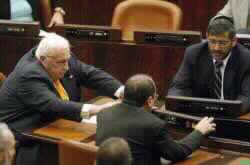- Author:
& News Agencies - Section:
WORLD HEADLINES
Sharon Calls New Israel Elections

In a surprise move, Prime Minister Ariel Sharon dissolved parliament Tuesday and called new elections for early February after he failed to rebuild his crumbling government. The dramatic developments throw Israel into a turbulent election campaign at a time when the nation is facing severe problems - the 2-year-old conflict with the Palestinians, a deepening economic crisis and the possibility of an Iraqi attack on Israel in the event of a U.S. strike against Saddam Hussein .
Sharon said he made the decision reluctantly, but that he had no choice because the alternative - succumbing to political blackmail by potential far-right coalition partners and thereby hurting ties with Washington - would have been worse.
"Elections are the last thing this country needs right now," Sharon told a hastily called news conference at his office.
He chided his former allies in the moderate Labor Party and a far-right party, the National Union-Israel Beitenu, blaming them for the end of his 20-month-old government. Israel has had five prime ministers in the past seven years.
While there had been expectations that Sharon would be forced into early elections, the speed of the announcement took many by surprise. Many believed Sharon would spend more time trying to lure the National Union into his coalition.
February elections - the emerging date was Feb. 4 - would leave an unusually short time for campaigning, and both Sharon and the main opposition party, Labor, face leadership primaries this month.
Nabil Abu Rdeneh, an adviser to Palestinian leader Yasser Arafat , said he hopes Israelis will choose a different government.
"What we are interested in right now is an Israeli government which is committed to the peace process, because the current government has failed in achieving peace and stability in the region," Abu Rdeneh said.
Sharon's broad coalition broke apart last week, after Labor quit in a dispute over funding for Jewish settlements in the West Bank and Gaza, and the prime minister on Tuesday accused his former coalition partner of acting irresponsibly. Labor's departure was a "political caprice," Sharon said.
Labor leader Binyamin Ben-Eliezer returned the blame, saying: "The government fell because you (Sharon) have contempt for the poor." Ben-Eliezer had demanded that settlement funding be cut by 145 million dlrs, for the benefit of pensioners, students, and poorer Israelis in provincial towns.
Ben-Eliezer and other Labor leaders have suggested that they will try to focus the coming campaign on the hobbled economy instead of the conflict with the Palestinians, an issue where Likud's harder line is currently more popular.
Sharon also had harsh words for the National Union, saying it had come with a long list of demands, including that he change the basic government guidelines and that he reject outright a new U.S.-backed peace plan.
"I made it clear that I am not going to change the guidelines, or the commitments that I took upon myself in my talks with the White House, and I will not deviate from the budget," Sharon said.
He also said that his transition government will fight Palestinian resistance men without compromise. Sharon's announcement came a day after a Palestinian resistance bomber from the Islamic Jihad faction blew himself up in a shopping mall in the central town of Kfar Saba, also killing two Israelis and wounding 11.
An Islamic Jihad spokesman, Mohammed al-Hindi, said he believed his group had contributed to the breakup of the coalition. "This is another achievement of the uprising, and this is another failure of the occupation policy against the Palestinian people," he said.
Under Israeli law, elections will have to be held on the last Tuesday before 90 days are up, with the countdown beginning once the decision to dissolve parliament has been published in the official Knesset registry - which is expected to take place in the coming days.
Feb. 4 was widely mentioned as the election date, but parliament's House Committee will make a final decision Wednesday.
After his negotiations with the National Union fell through, Sharon met with Israeli President Moshe Katsav and asked his agreement to dissolve parliament and call elections. Katsav then went on national television just before Sharon's press conference to say he had accepted Sharon's decision.
Polls suggest Sharon's Likud may grow somewhat stronger, but many observers are predicting the elections will be followed by yet another Likud-Labor coalition.
In the coming weeks, both Sharon's Likud and the Labor Party will choose candidates for prime minister. Sharon's chief rival is ex-premier Benjamin Netanyahu , who over the weekend in effect rebuffed an offer by Sharon to serve as his foreign minister. Sharon said Tuesday that the offer still stands.
Labor's primaries will take place in two weeks, with Ben-Eliezer trailing two more dovish candidates, Haim Ramon and Amram Mitzna.
PHOTO CAPTION
Israeli Prime Minister Ariel Sharon , left, Finance Minister Silvan Shalom, center, and Minister of Interior Eli Yishai, right, vote in the Israeli Knesset, Israel's parliament, during the no-confidence motion vote in Jerusalem Monday Nov. 4, 2002. The vote comes in the wake of last week's collapse of Israel's coalition government when the Labor ministers walked out, throwing the country into a political crisis. Sharon is undertaking intense political negotiations with various right-wing factions to form a government within the next week. (AP PHOTO/Menahem Kahana, Poo


 Home
Home Discover Islam
Discover Islam Quran Recitations
Quran Recitations Lectures
Lectures
 Fatwa
Fatwa Articles
Articles Fiqh
Fiqh E-Books
E-Books Boys & Girls
Boys & Girls  Women
Women









